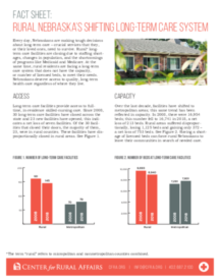Access
Long-term care facilities provide access to full-time, in-residence skilled-nursing care. Since 2008, 30 long-term care facilities have closed across the state and 23 new facilities have opened; this indicates a net loss of seven facilities. Of the 30 facilities that closed their doors, the majority of them, 23, were in rural counties. These facilities have disproportionally closed in rural areas.
Capacity
Over the last decade, facilities have shifted to metropolitan areas; this same trend has been reflected in capacity. In 2008, there were 16,954 beds; this number fell to 16,741 in 2018, a net loss of 213 beds. Rural areas suffered disproportionally, losing 1,125 beds and gaining only 372 – a net loss of 753 beds. Having a shortage of licensed beds can force rural Nebraskans to leave their communities in search of needed care.
Provider shortages
Staffing in long-term care facilities is a significant resource burden and qualified professionals are hard to find.
· 64 of Nebraska’s 93 counties are at least partially in a primary care health professional shortage area.
· 50 counties are partially located in health professional shortage areas: 43 are in rural counties and 7 are in metropolitan counties.
· 14 counties are wholly located in health professional shortage areas. All are rural counties.
Medicaid and Medicare reimbursements
Rural long-term care facilities rely heavily on federal programs like Medicaid and Medicare to provide care. Medicaid shortfalls, or the gap between the daily cost of providing needed care and the amount reimbursed by the government, have been growing for several years. Furthermore, rural populations tend to be older, sicker, and poorer than their urban counterparts; many rural patients are unable to cover the remaining costs of accessing care. Long-term care facilities are left to cope with the financial pressure of providing uncompensated care. In 2015 alone, the total Medicaid shortfall for Nebraska’s long-term care facilities was $58,318,153.
Conclusion
A number of factors influence long-term care decisions for thousands of Nebraskans every day. Access to long-term care facilities with the capacity to meet their needs is a growing challenge for rural residents. Health professional shortages, Medicaid shortfalls, and the financial reality of uncompensated care are accelerating the issue in rural areas. Nebraskans, no matter where they live, deserve to have access to long-term health care.


